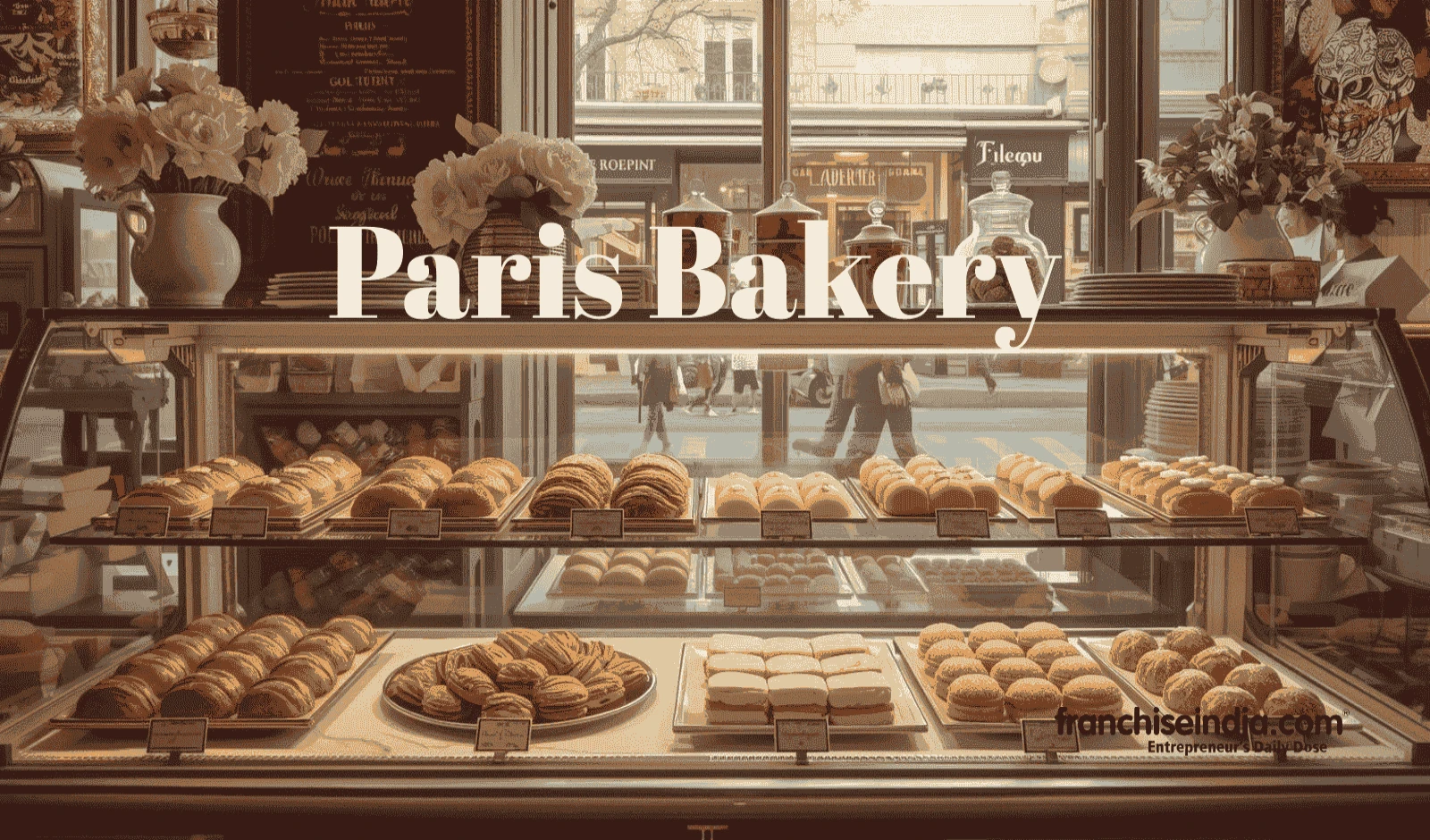
For entrepreneurs in India, the Paris bakery chain presents a compelling opportunity to those who are more regional, approachable, and in high demand for bakeries. This is a domestic model that focuses on accessibility, smaller footprints, and rapid ROI. This article provides a comprehensive breakdown of the cost, requirements, and the step-by-step approach to opening a Paris bakery franchise in the Indian market. Read this till the end to have a clear approach before investing.
Also read: Bakery Business in India: Key Steps & Business Plan
Understanding the Paris Bakery (India) Business Model
.png)
The Indian Paris Bakery operates on fundamentally different principles.
| Feature | Description | Implication for Franchisee |
|---|---|---|
| Product Core | Cakes, pastries, muffins, and quick-serve confectionery. Less emphasis on expansive, fresh-baked artisan bread. | Requires a smaller, simpler kitchen setup. |
| Model Type | Primarily a takeaway/delivery model, often with minimal or no seating. | Lower space requirement, drastically reducing rent and build-out costs. |
| Pricing | Middle-segment pricing, accessible to the mass market and ideal for celebrating smaller occasions (birthdays, anniversaries). | High-volume sales potential in non-metro and Tier-2/Tier-3 cities. |
| Operational Simplicity | Relies on streamlined processes, pre-mixes, and centralized raw material supply. | Reduced need for highly specialized, expensive master bakers. |
The biggest draw of this regional model is the manageable investment size.
Paris Bakery Franchise Cost: A Detailed Breakdown
The total initial investment for a Paris Bakery is significantly lower than for other international models.
| Cost Component | Estimated Investment (INR) | Notes |
|---|---|---|
| Franchise Fee (One-Time) | ₹2 Lakhs – ₹3 Lakhs | Non-refundable fee for brand rights and initial training. |
| Infrastructure Investment | ₹8 Lakhs – ₹15 Lakhs | Covers interior design, counters, signage, and basic civil work. |
| Equipment & Machinery | ₹4 Lakhs – ₹7 Lakhs | Includes display refrigerators, deep freezers, ovens (if needed), mixers, and POS systems. |
| Initial Stock & Raw Material | ₹50,000 – ₹1 Lakh | Initial inventory, packaging, and perishable ingredients. |
| Working Capital (3 Months) | ₹1 Lakh – ₹1.5 Lakhs | Buffer for rent, staff salaries, and utilities during the ramp-up phase. |
| Total Estimated Initial Investment | ₹15 Lakhs – ₹27.5 Lakhs | This is an all-inclusive estimate for a fully operational unit. |
Note: These figures are based on market averages for medium-scale Indian bakery franchises and should be confirmed with the franchisor's latest disclosure document.
Ongoing Fees (Royalties)
Royalty Fee:
Royalty typically ranges from 5% to 7% of gross sales. This fee includes brand development, product R&D, and centralized advertising.
Revenue Share Model:
Some sources suggest a revenue-sharing model where the franchisee retains a high percentage.
Also read: How to succeed in a bakery business
Key Requirements for a Paris Bakery Franchise
A. Area and Location Requirements
| Requirement | Details |
|---|---|
| Unit Area | 200 sq. ft. to 400 sq. ft. |
| Preferred Location | High-street ground floor, bustling market areas, near schools/colleges, or prime locations in residential societies. |
| Power Supply | An adequate 3-phase commercial power supply is essential to run cooling and baking equipment. |
B. Franchisee Profile and Experience
Financial Capacity:
Must have financial capital as well as some working capital set aside to entertain the cost of operations for the initial months until the business starts making a profit.
Age and Eligibility:
Must be an Indian citizen, typically aged 21 or older.
Business Experience:
Prior business experience is not mandatory but having it is a plus. The franchisor provides the necessary training, so they want people who are willing to learn and are able to maintain the quality standards.
C. Operational Commitments
Staffing:
Requires a team of 1 to 3 personnel minimum, typically a store manager and delivery person.
Sourcing:
Franchisees must strictly adhere to the company's centralized supply chain to ensure product quality and consistency.
Technology:
For sales tracking management and integration with online platforms like Zomato/Swiggy, the franchisee must implement the POS system.
Profitability and ROI Potential (Indian Context)
.png)
The high profit margins inherent in the bakery business make this a lucrative area.
Estimated Profit Margins
Gross Margin (COGS):
Bakeries typically operate with a gross margin on cakes and pastries of about 50% to 70%.
Net Profit Margin:
After calculating the total amount of rent, staff salaries, utilities, and royalties, the net profit margin for a well-managed franchise in India is usually estimated to be between 15% and 25%.
ROI and Breakeven Time
Breakeven Time:
Given the minimal initial investment, regional bakery franchises often boast a very fast breakeven and ROI period. According to sources, the breakeven time for a Paris Bakery unit is to be around 12 to 18 months.
Monthly Earnings Target:
With daily sales of around ₹15,000, a franchisee could potentially target a net monthly profit of ₹1,00,000 or more, depending on location and operational efficiency.
Also read: How to Start a Karachi Bakery Franchise?
How to Apply for the Paris Bakery Franchise
The application process is standardized, designed to assess the financial viability of the prospective partner.
Step 1: Research and Initial Contact
You can start by visiting the official website of the Paris Bakery and go to the franchise or contact me option. Fill out the franchise enquiry form. they might ask you for your personal information, like your financial investment, proposed location, etc.
Step 2: Business Proposal and Due Diligence
The franchisor will share a detailed franchise presentation including formal proposals outlining important aspects. You will be required to submit the financial documentation to invest the required capital.
After all this is done and your financial capacity is approved, the franchise team will conduct a site inspection to evaluate your proposed location. This will be done on the basis of competition, visibility, and foot traffic.
Step 3: Agreement and Fee Payment
Once the location is approved, both parties will finalise the terms and conditions of the agreement. This part is essential to have this document verified by a qualified franchise lawyer.
You will pay the one-time franchise fee and the agreement will be signed.
Step 4: Store Setup and Launch
The franchisor will provide the complete detailed blueprint of the store design and layout. The franchisee will arrange and manage the construction, civil work, and interior as per the specifications. After everything is done, you and your staff will undergo the mandatory training. This training will include POS system operations, inventory management, and customer service.
Finally, the company's launch team assists with setting up the initial inventory, quality checks, and managing the initial opening phase.
Disclaimer and Final Advice
The name “Paris Bakery” is used by multiple, unrelated original chains in India. Before proceeding, ensure you are dealing with the established and original franchisor with a verifiable track record and registered business.
- Confirm the brand’s network and stability before you invest, particularly in the state you plan to open.
- This is the most crucial step. Speak with at least 3-5 existing franchisees to understand the real problems, support and costs, etc.
- Read any document clearly before signing it.
You might also like: House of Candy franchise: Cost and how to get?

